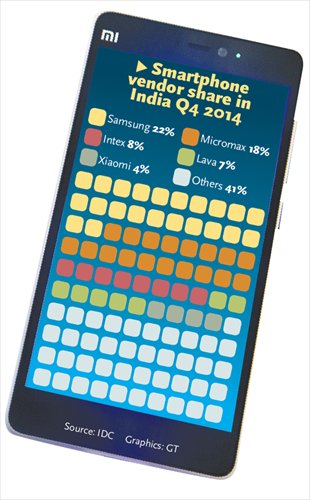
Analysts don't see any benefits, cite distribution, price as main obstacles
Fast-growing Chinese smartphone maker Xiaomi Inc said on Monday that it has received investment from the chairman emeritus of Indian conglomerate Tata Sons, in a move to further boost its presence in the Indian market.
Ratan Tata has become Xiaomi's newest investor, Li Lei, a PR manager with Xiaomi, told the Global Times Monday, but refused to reveal the financial details and the shareholding structure of the deal.
Xiaomi, which was ranked as the fifth biggest smartphone vendor worldwide in the fourth quarter by US market consultancy IDC, was reportedly valued at $45 billion after the company raised $1.1 billion in a December funding round from investors such as Hong Kong-based All-Stars Investment Ltd and Yunfeng Capital, a private equity firm founded by Alibaba's Jack Ma Yun.
Li from Xiaomi did not reveal how the two will cooperate with each other, but Hugo Barra, an ex-Google executive and now the head of Xiaomi's global division, said on his social networking account Twitter on Sunday that Xiaomi expects that Ratan Tata can help "build Mi India as a truly Indian company."
Ratan Tata was the chairman of Tata Sons, a Mumbai-based conglomerate, for more than two decades. The conglomerate is involved in sectors like real estate, telecommunications, IT and automobiles. He has previously invested in leading Indian online retailer Snapdeal in August 2014.
Without a doubt, Ratan Tata, a respected businessman in India, can help Xiaomi have a better understanding of how to do business in the Indian market, Li Yi, secretary-general of the China Mobile Internet Industry Alliance, told the Global Times Monday.
After entering India in July 2014, Xiaomi has had a few issues in the market.
In August 2014, the Chinese firm was reportedly criticized by the Indian Air Force for allegedly stealing local users' private information from their phones and transferring it to Xiaomi's servers in China, leading to Xiaomi's decision to migrate the data of its overseas users to servers in the US and Singapore.
In December, Xiaomi experienced a temporary ban on sales in India due to its ongoing patent spat with Swedish technology company Ericsson. Xiaomi refused to comment on the spat, while Ericsson could not be reached for comment on this by press time.
Despite the challenges, Xiaomi is still actively pushing forward its expansion into India, where analysts said the extremely low smartphone penetration marks a potential growth spot.
On Thursday, the Beijing-based smartphone vendor held its first global launch conference outside its home market in New Delhi, introducing its Mi 4i smartphone model that features six Indian languages.
But Xiaomi will not see a surge in the sales of its new gadgets in the market despite the cooperation with Tata, said the analyst Li.
"Whether Xiaomi can earn itself a leading spot in the ranks of smartphone brands in India mainly depends on the tie-ups with local phone distributors," said Li.
Claiming sales of 1 million smartphones in India via online retail partner Flipkart within five months since making its debut in the market in July, Xiaomi was ranked as the fifth largest smartphone vendor in India during the fourth quarter of 2014, according to IDC, lagging behind the leader South Korea's Samsung and local brands such as Micromax and Lava.
Wang Yanhui, head of Shanghai-based Mobile China Alliances, agreed with Li Yi, noting that besides distribution, the localization of user experience is another major issue that needs to be tackled.
Xiaomi's smartphones have no distinctive features or edges compared to those produced by its counterparts, including South Korea's Samsung and Chinese phone maker Lenovo, and the price tag of the Mi 4i is not that appealing to local price-sensitive consumers either, Wang told the Global Times on Monday.
"Low-budget smartphones that sell well in India usually cost from $100 to $200," in comparison with Xiaomi Mi 4i's price tag of 12,999 rupees ($205), said Wang.
















































